by Jeanne Dittmann
Hallways transformed
Art hanging, illuminating
Spaces filled
Offerings given
For seven years, St. Matthew Lutheran Church has hosted Art as Worship: A Gallery Exhibition and Benefit, fulfilling our Fine Arts Ministry’s mission to worship our Creator God and foster creativity in our community. We hope that you will join us this year in this artistic ministry event.
Each year, the committee selects a theme and invites artists – young and old, near and far, professionals and hobbyists – to respond to the theme through art. This year’s theme is MYSTERY, past themes have included RENEWAL, LIGHT, and REFLECTION. The theme is posted along with application information on our blog early each year to give artists several months to consider the theme and make plans to create their response. As the deadline approaches each fall, the committee eagerly anticipates the next stage in the annual event.
The bare walls of our church’s hallways go largely unnoticed through the year, as the unobtrusive gallery hanging system hides in plain sight when not in use. The art curators – Jeanne Dittmann and DeAnna Toten Beard – gather the submitted pieces, admire the artistry in each, and set to work. We plan out how to highlight each piece of art within the context of the larger exhibit. Then we hang, straighten, and illuminate each piece. Artist statements and gallery information are posted alongside each work. The food is set out and the lounge space is assembled. The musicians arrive and prepare their own creative contribution. And then we wait.
We wait for the doors to open and for our guests to enter into this transformed space. Although the artwork will hang for several weeks, there is nothing like seeing it all together for the first time on that special gallery evening. Our hallways fill with expectant congregants and friends and family and artists and worshippers. People nibble on their hors d’oeuvres, sip their wine, and chat about the images and the meaning of what they are seeing. Oftentimes there are new artists who have never before displayed their work in an exhibit. We love to see their eager faces as they approach their own art in this setting, a moment when their personal sense of their own creativity is expanded. And then they begin to look carefully at the other art, and other patrons take their places in front of that first piece of art. And this process of viewing art, reading the artist’s words, examining the details, and moving to the next piece quickly fills the evening.
And while the artistic community is coming together around the art and enjoying the live music, we also ask that same community to reach beyond themselves. We invite our visitors to bring canned goods or make a monetary donation to the Caritas Food for Families drive that brings the larger Waco community together each November. In this way, art brings people together in a creative worshipful environment, and in response to that environment, we reach out to others in a gesture of love.
If you are interested in participating in this year’s Art as Worship exhibit, please visit our blog to fill out an application. The exhibit is open to artists working in all media. Entries must be original artwork and must be consistent with the show theme. Each applicant may submit up to two works. Artwork must be framed with sturdy wire across the back for hanging. The St. Matthew Fine Arts Ministry reserves the right to reject work that is deemed inappropriate or which differs from the submitted image. Works do not need to be explicitly Christian in nature.
There is no entry fee. Each artist may submit up to 2 works. 3D works are allowed with up to two images per entry (no more than 4 images total). All images must accompany the completed application information. The submission deadline is October 16, 2017.
The opening gala will be held on Saturday, November 4 from 6:30 – 9:00pm at St. Matthew Lutheran Church at 800 North New Road in Waco, Texas. Please plan to join us for art, music, hors d’oeuvres, and fellowship. The artwork will hang throughout the Thanksgiving, Advent, and Christmas seasons. If you cannot attend the opening gala, the exhibit will be open on Sunday mornings and during the week if someone is in the office. Please call the church office (254-772-9349) if you wish to come during the week.
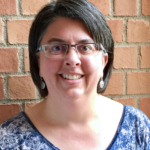 Jeanne Dittmann is a calligrapher and graphic designer who has worked as a freelance artist in Waco for over 14 years. She serves currently as President of the Waco Calligraphy Guild, and she teaches calligraphy through Baylor University Continuing Education. Her day job is the Box Office and Marketing Manager for the Baylor University Theatre. Jeanne and her family attend St. Matthew Lutheran Church, where she and DeAnna Toten Beard started the Fine Arts Ministry 8 years ago. For more information, please contact her at [email protected]
Jeanne Dittmann is a calligrapher and graphic designer who has worked as a freelance artist in Waco for over 14 years. She serves currently as President of the Waco Calligraphy Guild, and she teaches calligraphy through Baylor University Continuing Education. Her day job is the Box Office and Marketing Manager for the Baylor University Theatre. Jeanne and her family attend St. Matthew Lutheran Church, where she and DeAnna Toten Beard started the Fine Arts Ministry 8 years ago. For more information, please contact her at [email protected]
The Act Locally Waco blog publishes posts with a connection to these Aspirations for Waco. If you are interested in writing for the Act Locally Waco Blog, please email [email protected] for more information.
By John Kinnaird
Since the inception of the Prosper Waco initiative, there have been three main areas of focus in working towards improved outcomes for all of those in our community: Health, Education, and Financial Security. As a community volunteer on several local boards, I’ve had the privilege of being closely involved with the Financial Security aspect of their initiative, which has also proven to be the most nebulous and difficult to define of the three focus areas. The overarching goal of improving the general wealth of our citizens is noble, but also difficult to quantify and track, and the path to that goal more winding than one would think.
Specific programs identified and supported to this point have mainly focused on the economic development and income-oriented aspects of wealth creation; i.e. how do we help people get jobs, and once they have them, how do we help keep them in that job and continue working towards even better-paying opportunities down the road? Also contained in this line of thought is financial literacy, which aims to assist folks in making better decisions with the money they have, and education on how to budget expenses and learn to live within one’s means.
Well, I feel there is also great opportunity to help find ways to address the expense side of the equation, and work to devise ways of lowering the everyday costs that go along with daily life. One of these that affects everyone, homeowners and renters alike, is the electric bill.
Texas has a deregulated electricity market, which means consumers get to pick which company provides them with their electricity. The idea behind deregulation is that an open market promotes competition, which in turn lowers costs and benefits the consumer. Unfortunately, picking an electric provider and the right plan can be a difficult and confusing maze to navigate, often resulting in sub-optimal outcomes and worse and more expensive plans being chosen than what someone could potentially obtain if they were able to understand all the nuances of the options available.
Enter a new initiative to address this problem, Waco Power Switch. Provided by a company called iChoosr who is partnering with Prosper Waco, this company aims to use the power of group bargaining to get a straightforward, cheaper price than what most consumers would be able to get on their own, while serving as an advocate for the consumer in negotiating and dealing with the electric company.
The process is simple: if someone is interested, they go to www.prosperwaco.org and register to be part of Waco Power Switch by providing some basic information. Then, iChoosr will take everyone that signs up and hold a reverse auction where electric companies will bid to be the electric provider to this group of consumers. The low bidder wins, and then everyone that signed up has the option, but NO obligation, to accept the contract. If the consumer doesn’t like the price obtained, they don’t have to take it. There’s no risk in signing up, and no obligation if someone ends up not wanting to switch.
There is a caveat, though. The electric company still retains the right to perform its due diligence, meaning credit checks, on the prospective customers who have signed up through Waco Power Switch. That means if someone has a poor payment history, or other credit problems, the electric company still has the right to request a deposit or some other type of extra step before accepting someone as a customer.
That said, other benefits do accrue to people who elect to receive their electric provider through this program. IChoosr will continue, through the life of the contract, to serve as a go-between for the consumer and the electric company. So, should there be a billing problem or some other issue, iChoosr will help resolve it and serve as a consumer advocate on behalf of the customer, which can be very helpful when dealing with a utility company.
This program has been very successful in England, with the average consumer saving around $250 per year. While on the surface that may not sound like a lot, if only ten percent of Waco households signed up and recognized this average savings, it would amount to around $1 million that would be in our citizens’ pockets instead of going to the utility company. This is an easy win for our citizens, and for the community.
This program is one step towards making life simpler for our community, and helping people save money on a recurring expense that has ample opportunity for greater efficiencies and savings. I’d encourage anyone who is interested to at least sign up and try it out. There’s no obligation, and you might just be able to save some money and find dealing with the electric company a little easier. It’s a good start towards helping people save and grow their overall wealth, and that can only be a good thing.
 John Kinnaird came to Waco in 1998 to attend Baylor University. After graduation, John was hired at Community Bank & Trust as a Credit Analyst. In his 15 years at Community he has risen to the position of Vice President and Trust Officer. John was elected to Waco City Council in May 2012. In addition to civic-related duties, John finds times to volunteer and take advantage of the disc golf courses and other activities that Cameron Park has to offer.
John Kinnaird came to Waco in 1998 to attend Baylor University. After graduation, John was hired at Community Bank & Trust as a Credit Analyst. In his 15 years at Community he has risen to the position of Vice President and Trust Officer. John was elected to Waco City Council in May 2012. In addition to civic-related duties, John finds times to volunteer and take advantage of the disc golf courses and other activities that Cameron Park has to offer.
The Act Locally Waco blog publishes posts with a connection to these Aspirations for Waco. If you are interested in writing for the Act Locally Waco Blog, please email [email protected] for more information.
By Angela Collier
In a recent blog post, Sara Beth Stoltzfus discussed the need for support groups for those who are direct caregivers. Care givers lead stressful lives taking care of themselves and taking care of another person and sometimes multiple people. Over the last couple weeks, more of us have stepped into a care giver role due to weather catastrophes. We all know someone affected directly by the floods in Houston, Louisiana and other parts of the south. We watch the devastation on the television and our hearts go out to all those involved. Everyone in our area is looking to help those affected directly in some way or another. Taking care of others takes a toll on us mentally and physically. While we are looking to help others, we may tend to neglect ourselves and our own needs. Even though we may not have been affected directly by the floods, our hearts have gone out to those who have and we begin to experience emotions of guilt and deep sadness for what has been happening to others. Our compassion leads us to become overwhelmed with feelings of depression, hopelessness and fatigue.
Compassion Fatigue is a state experienced by those helping people or animals in distress; it is an extreme state of tension and preoccupation with the suffering of those being helped to the degree that it can create a secondary traumatic stress for the helper. In the past, you may have heard this stated as survivor’s guilt. A search of the internet found the definition of survivor’s guilt as a particular type of guilt that may develop in people who have survived a life-threatening situation. Individuals who believe it is unfair that they survived when others died and/or believe they did not do enough to save the lives of others, or help after words to give enough help may come to experience survivor guilt after trauma or a catastrophic event.
There are many factors involved and we all experience life differently. Some of the symptoms of survivor guilt can include but not limited to:
- Nervousness/sadness/nervousness/anxiety
- Sleep Disturbances (not being able to sleep, sleeping too much, nightmares)
- Memory disturbances (not being able to remember things, not able to learn new things)
- Gastric disturbances (nausea, vomiting, diarrhea, weight loss/gain)
- Headaches, body aches and pains
Although feelings of guilt associated with surviving a life-threatening event or having feelings of not helping enough can be painful and difficult to overcome, it is possible to address and cope with such feelings. It may be helpful to first acknowledge those feelings and recognize that both are common emotions and a natural part of the process of healing from grief. Accept what you are feeling and know you are not alone. Others may be struggling just as you are. Remember your relief and appreciation for your survival can co-exist with your grief. Do not focus on the “whys” of the event and focus on what you can do now.
Also, remember to take care of yourself. A self-care routine is considered to be an important part of emotional healing and to stay healthy. Self-care typically involves regular physical movement (walking, exercise), soothing or relaxing activities (reading, writing, meditating), a nutritious diet, and plenty of rest. Support is also a crucial component of coping with survivor guilt. Speaking with others who shared the experience; attending a support group; or seeking help from a trusted mentor, adviser, or spiritual counselor can help an individual feel understood. Some may also find it helpful to find a way to memorialize or honor the losses of property and life. Acknowledge and accept the emotions that you are experiencing as they represent part of the healing process.
Should you continue to feel overwhelmed, seek out the help of a professional such as a counselor or therapist. A counselor can help you to manage and process emotions and challenge the thought patterns that may be contributing to the strong emotions that are causing the discomfort. Most of all remember you are not alone; there are others that are working through their emotions too. You can live the best life that you can to help honor those we have lost.
 Angela Collier is a Licensed Professional Counselor in Waco who is trained in Cognitive Behavior Therapy (CBT) and Cognitive Processing Therapy (CPT) for helping individuals with trauma. Angela was born and raised in the Waco area. Angela enjoys spending time with her husband of 36 years, Travis, and their son and Daughter in law Travis and Virginia Collier and their three grandchildren Lillian, Matthew, and Mary. When not with family, Angela enjoys traveling worldwide to experience new places and people. Angela has been involved with several local agencies helping support local families in times of need.
Angela Collier is a Licensed Professional Counselor in Waco who is trained in Cognitive Behavior Therapy (CBT) and Cognitive Processing Therapy (CPT) for helping individuals with trauma. Angela was born and raised in the Waco area. Angela enjoys spending time with her husband of 36 years, Travis, and their son and Daughter in law Travis and Virginia Collier and their three grandchildren Lillian, Matthew, and Mary. When not with family, Angela enjoys traveling worldwide to experience new places and people. Angela has been involved with several local agencies helping support local families in times of need.
By Louise Henderson
In the wake of a hurricane affecting South Texas and Louisiana I am resolved that we as a community can do many great things when we work together. We can have an impact on our community when we get our resources, manpower, and knowledge together. For five days I waited like other families for my relatives in the hurricane affected areas to respond, but as time passed I realized I could do more. So instead of worrying, I gathered what I had and asked other friends and neighbors to do the same. Within a few hours Trail Riders, Motorcycle Clubs, Social Clubs, and churches were able to load several trucks and send them not only to Houston but to other parts of South Texas.
So why can’t we have that same impact in our communities where we live? We can as groups start to come to together to combine all our talents to do health fairs, to share information about resources, to help those that are elderly and low incomes.
I am seeing a shift in attitude from “ I am only going to help if it benefits me” to “ I need to start doing more and working with others to make a change in my neighborhood.” Groups are working systemically with each other to impact small areas of Waco. For instance, there are four different groups that have decided they can reach more children and families by collaborating their efforts and supporting each other in the Estelle Maxey apartments. Trail Riders and Motorcycle Clubs are starting to work to host back-to-school events that reach larger quantities of families. These are the types of changes we are seeing from groups working together.
I work with Kindergarten children and there is a story that most early childhood teachers read to their children it’s called “Stone Soup.” It’s about a group that is hungry and so they convince the people in the town to start bringing the little bits of food they are keeping to themselves to contribute to one big pot of soup that everyone can enjoy. Sometimes we have to realize that even with the little you have you can feed a lot of people.
There are so many great groups and orgazianations we don’t know about but are doing duplicate things. My hope is that we will see that if we stop waiting on outside help to come and start working together as a community we can rebuild our city. With so many changes taking place we have forgotten that your neighbor is not just the person who lives next door, they are also the ones that we see on the streets of downtown and everywhere. We can achieve a level of self-sufficiency if we would take the time to realize that when we work as one unit, and not against each other, we can not only reach the stars, we can go the Milky Way! Age, gender, and social status are no longer excuses for us not to actively take part in what is happening in our community. What happens in East Waco will and can affect what is happening in China Spring and Woodway. We can do this. We can make this Happen. If we come together and make this Happen.
 Louise Henderson has four daughters — one at Texas A&M (Elizabeth), two at University High School (Rachel and Naomi) and one at Cesar Chavez Middle School (Rebecca) — and puppy named Rico. She and her family have lived in Waco for six years and are very active in our community. She is a member of the Junior League of Waco, NAACP of Waco, and Waco Knight Riders. She graduated from McLennan Community College with an Associate’s Degree in Child Development and is working towards a Bachelor’s degree in Child and Family studies at Tarleton State University. She loves Taco Tuesday at Rosas Café and volunteering in Waco. She is the founder of the Central Texas Divas, a social club for women and young girls to empower and educate about them about self-improvement and our community.
Louise Henderson has four daughters — one at Texas A&M (Elizabeth), two at University High School (Rachel and Naomi) and one at Cesar Chavez Middle School (Rebecca) — and puppy named Rico. She and her family have lived in Waco for six years and are very active in our community. She is a member of the Junior League of Waco, NAACP of Waco, and Waco Knight Riders. She graduated from McLennan Community College with an Associate’s Degree in Child Development and is working towards a Bachelor’s degree in Child and Family studies at Tarleton State University. She loves Taco Tuesday at Rosas Café and volunteering in Waco. She is the founder of the Central Texas Divas, a social club for women and young girls to empower and educate about them about self-improvement and our community.
(During December we will be reprising some of “2017’s greatest hits” from the Act Locally Waco blog. I couldn’t possibly pick my favorites – so I used the simple (cop out?) approach of pulling up the 10 blog posts that got the most “opens” according to our Google Analytics. It is an intriguing collection that gives at least a little insight into the interests and concerns of Act Locally Waco readers. I hope this “Top 10” idea inspires you to go back and re-read your personal favorites. There have been so many terrific ones… If you would like to see the Top 10 according to Google Analytics, here’s the link: 2017 Greatest Hits. Merry Christmas! — ABT)
By Eloisa Haynes
What a hard week this has been for you and everyone who loves you. I am grieved at the uncertainty that you and your family face now that President Trump has decided to terminate the Obama-era Deferred Action for Childhood Arrivals (DACA) program. We all knew that DACA was the equivalent of receiving a band-aid for a shotgun wound—but we rejoiced over the band-aid. It opened the opportunity for you and many others to obtain a driver’s license and enter the workforce. It allowed you to come out of the shadows and not be afraid for the first time. It opened the door to achieve the American dream. It gave us all hope.
As a formerly undocumented immigrant, who remains in this country by the sheer will and grace of God, I know what it is to live in fear and isolation. I feel compelled to acknowledge and validate your pain. Those who know little about the brokenness of our immigration system will likely downplay the severity of your situation in hopes to cheer you up. Those of us who have been entangled in the immigration system know better and are keenly aware that you and your loved ones are in a perilous situation.
It is right and proper to cry, to feel despair, to experience anger and hopelessness – but only briefly. You and I do not have the privilege to curl into a ball and hide, or to roll over and die. Our parents sacrificed everything that makes life worth living to give us a chance for a better life. We cannot fail them. Being undocumented puts individuals like us in a vulnerable position. We carry around the stigma of illegality. We isolate ourselves and at times keep our neighbors at arm’s length in order to protect ourselves. To conceal our immigration situation, we allow the media and politicians to drive the narrative about who we are. But we cannot afford to live that way any longer.
Let me remind you that DACA did not come about because President Obama was a kind-hearted, compassionate politician. No – it happened because brave young men and women like you shared their stories and demonstrated that our hearts beat for America. Others who have come before you stuck out their necks and risked everything. If there is any compassion for Dreamers in the current political climate, it is because Dreamers like you have fought the good fight for the right to belong in this great nation.
Ecclesiastes 3:7 tells us that “there is a time to be silent and a time to speak.” I believe this is the time to speak. What do you have to lose? You have been stripped of everything – except for the love you have for Waco and the United States. This is the time to reach out to your neighbors, co-workers, teachers, professors and friends. Come out and tell them your story. Let your story shed light. Let your story stand as a contrast to the narrative our neighbors and friends hear from the media day in and day out. Let your pastor and your coach meet a Dreamer – come out and claim your place in our great community. They already love you and care about you. If their political views say otherwise, it is only because you and I have failed to bring our humanity into this political conversation. We are not pawns. We are productive members of our community – we are nurses, students, business owners, parents, church leaders… It is time to speak.
If you are a Dreamer and would like a community of friends in these difficult times, reach out to the Waco Immigrants Alliance. In this political climate where it feels like the rain keeps coming and it is up to our necks, our goal is to ensure no immigrant in our community treads the water alone. But we will not just tread beside you – we will sing. We will raise our voices together, to sing the songs that tell our collective story for all the world to hear. Our story is our battle cry. It is our greatest weapon of peaceful revolution. Jesus Christ taught the greatest lessons in parables, revealing the power that a story holds in our heart. So together, we will sing and share and cry and rejoice, until all our lives no longer exist “in the shadows,” and our national policies respect the God-given dignity and worth of all immigrant lives. And with each victory, big or small, we will give thanks with una danza alegre. (Ps. 30:11-12).
 Eloisa Haynes is a wife and mother of U.S. citizens, yet she is still entangled in the broken immigration system. To her, Waco is a special community – the place where she first met Jesus, started a family and found friends who have supported and encouraged her. She is proud to call Waco her home and believes that everything she has accomplished, the Lord has done for her (Isaiah 26:12). She works in higher education and volunteers as a community organizer.
Eloisa Haynes is a wife and mother of U.S. citizens, yet she is still entangled in the broken immigration system. To her, Waco is a special community – the place where she first met Jesus, started a family and found friends who have supported and encouraged her. She is proud to call Waco her home and believes that everything she has accomplished, the Lord has done for her (Isaiah 26:12). She works in higher education and volunteers as a community organizer.
By Madiha Kark
It’s still a few hours before Veronica Trejo-Evans, 43, will open her food truck at a busy strip mall on West Waco Drive. Nestled between car repair workshops and a beauty parlor, Dos Mundos Spud Shack is a labor of love. As a first-generation American, Veronica prides herself on the work ethic and sense of responsibility her Mexican parents instilled in her. The classes she took at McLennan Community College helped to make her food truck dream a reality.
 Veronica had never been in the food business up until five months ago. She and her husband, Cyrus Evans, had fantasized about opening a food truck someday. It was one of those fantasies that would happen when life slowed down a little. Life did slow down for Veronica and Cyrus in an unexpected way, when she lost her 20-month-old son. His death left a void, forcing the Evanses to ask, “What next?”
Veronica had never been in the food business up until five months ago. She and her husband, Cyrus Evans, had fantasized about opening a food truck someday. It was one of those fantasies that would happen when life slowed down a little. Life did slow down for Veronica and Cyrus in an unexpected way, when she lost her 20-month-old son. His death left a void, forcing the Evanses to ask, “What next?”
The idea for the food truck came when the couple was on a trip to Mexico and saw a line form. Upon investigating, they found the culprit to be a guy selling a bag of Doritos with nacho cheese and jalapenos. “My husband was like, ‘Wow!’ And for me, it was so normal to see,” said Veronica. Food trucks have been in the U.S. since 1872, but have become especially popular in the last few years. Many restaurateurs who are hesitant to take on a new restaurant have turned to mobile canteens as a less expensive way to sell food and reach customers. For Veronica, the low cost was definitely a pull and something she was familiar with — food trucks and street food carts pepper the Mexican landscape. “I didn’t want another taco stand or another burger joint. I wanted to do something different.”
….
Behind closed shutters, Cyrus and a helper have been prepping the spuds and other ingredients for the lunch crowd since 8 a.m. Veronica takes a short break from the prep work to reflect on what she learned in her class at MCC, “Even though you have plans and thoughts, you still have to do your work and do your research,” says Veronica remembering the challenge of being in a classroom of students 20 years younger. A Texas Workforce program paid for her tuition, books, and supplies. The program is designed for professionals who, like Veronica, were once working but had to stop for some reason and needed some new skills.
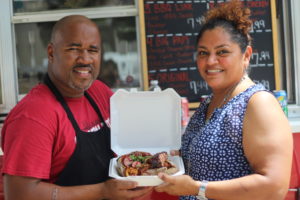 Of her time at MCC, Veronica says she wouldn’t have had the food truck if it wasn’t for what she learned in her classes. “I sat in the front every day – they (her teachers) were gonna know me, and I was gonna know them. They’ll take the time; they’ll meet with you. That was very valuable.” Veronica says if you follow the blueprint the advisors give you, they won’t let you down. “MCC was phenomenal especially coming in at an older age,” she says. It gave her a chance to mentor and connect with her classmates in a different way and discover a new world.
Of her time at MCC, Veronica says she wouldn’t have had the food truck if it wasn’t for what she learned in her classes. “I sat in the front every day – they (her teachers) were gonna know me, and I was gonna know them. They’ll take the time; they’ll meet with you. That was very valuable.” Veronica says if you follow the blueprint the advisors give you, they won’t let you down. “MCC was phenomenal especially coming in at an older age,” she says. It gave her a chance to mentor and connect with her classmates in a different way and discover a new world.
Dos Mundos has been in business for a few months but has already made a name for itself among the local Wacoans. Their Facebook page has over 1500 followers and a five-star review. But Veronica still holds on to the paper from her marketing class with Margaret Sanders that says, “I believe you have something here.” Veronica remembers her first day in that class. When she found out what they would be covering, she was ecstatic! She knew then this was the missing puzzle piece for the food truck dream. “This is what I needed to make it happen,” she said.
 The Evanses didn’t do any traditional advertising but utilized social media channels to spread the word. Veronica strongly believes that “every business leads through the heart of the owners.” The couple loves to cook, but “a business is very different from a nice dinner at home.” They had to find suppliers and develop their production process, learning along the way. All of the recipes they’ve developed have come from their own kitchen. The bestseller at Dos Mundos is called the Big Papi (an homage to Veronica’s Mexican heritage) — a spud topped with a rib, a link, and chopped BBQ.
The Evanses didn’t do any traditional advertising but utilized social media channels to spread the word. Veronica strongly believes that “every business leads through the heart of the owners.” The couple loves to cook, but “a business is very different from a nice dinner at home.” They had to find suppliers and develop their production process, learning along the way. All of the recipes they’ve developed have come from their own kitchen. The bestseller at Dos Mundos is called the Big Papi (an homage to Veronica’s Mexican heritage) — a spud topped with a rib, a link, and chopped BBQ.
On a slightly cool March day in 2017, as the sun shone above the sky, some 20 family members gathered outside the Dos Mundos truck to support Veronica. They were her first customers. Her parents came from El Paso, as well as aunts, uncles, and cousins for the ribbon-cutting ceremony. Veronica had practiced on her cash register, but still everything was a rush. When the couple closed the doors that day, they were overwhelmed with joy and tears, she says. Remembering the day like a fond memory, “The support from the family let us know we got this,” Veronica tears up again, but still smiles with joy at a dream come true.
Veronica Trejo-Evans took classes at MCC through the Workforce Investment Act (WIA). WIA is one of many Texas Workforce Commission (TWC) programs that helps employees get in to the workforce. To be accepted into the WIA, Veronica passed an eligibility and aptitude test and a face to face interview. Once accepted she began an Associates in Accounting program at MCC. For a list of eligibility requirements visit http://www.twc.state.tx.us/partners/workforce-investment-act#wiaEligibility
For a list of programs available see the TWC website: http://www.twc.state.tx.us/programs. If you have questions about these programs or would like more information visit their website http://www.twc.state.tx.us.
 Madiha Kark is a Marketing, Communications and Photography Specialist at McLennan Community College. She holds an M.A. in Journalism from the University of North Texas. She loves to travel, cook, and read nonfiction books.
Madiha Kark is a Marketing, Communications and Photography Specialist at McLennan Community College. She holds an M.A. in Journalism from the University of North Texas. She loves to travel, cook, and read nonfiction books.
by Donald Felice
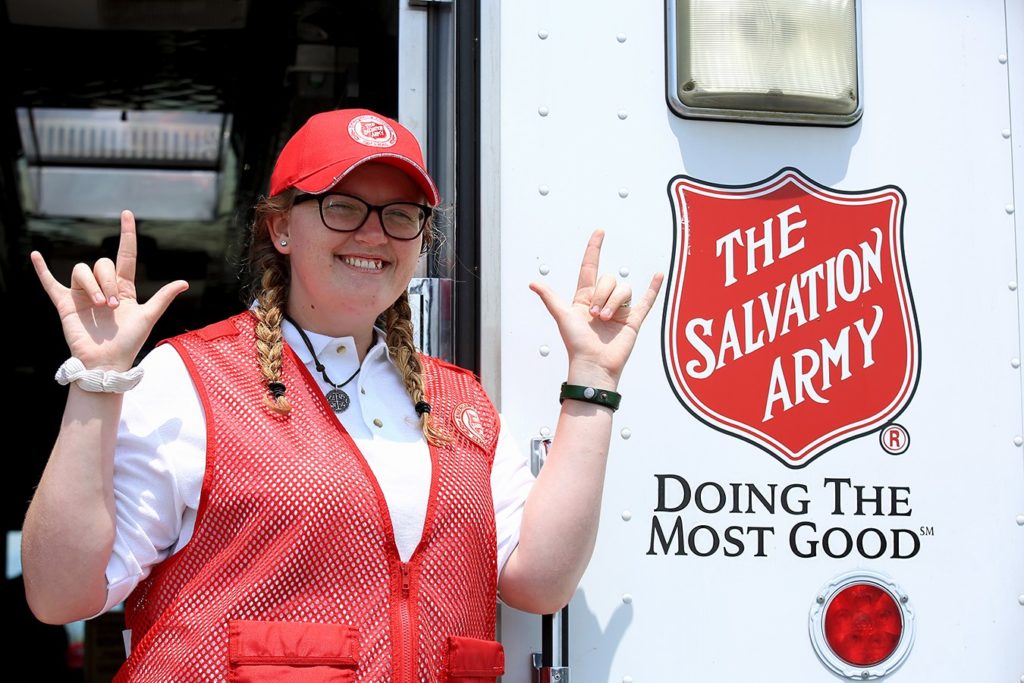
Laura Stevenson of Waco, TX, communicates “love” in sign language.
Hope is an amazing thing. It can take a person by the hand and lead them out of the depths of despair. It can raise up a community out of unthinkable disaster. And it can bless us with immeasurable spiritual riches in the midst of desperate times.
When Hurricane Harvey hit the tiny coastal town of Port Lavaca, Texas, many people found themselves dazed and confused. In the aftermath of the storm, their little community was left for a time with no power, tainted water, and scarce, if any, word as to how bad the situation was in their little corner of Texas. Uncertainty prevailed.
But imagine facing the storm when you cannot hear or communicate with anyone to express your fear or how much you need help. There is no aloneness like silence in a raging storm. No more feeling of hopelessness than not being able to make yourself understood in a life-threatening situation.
“What do you want?” The Salvation Army canteen volunteers asked. “How many meals?” Trying a little louder they asked the woman energetically motioning to them, “Are you OK?”
With increased worry and frantic expressions, the woman signed to the volunteers that she was deaf, but to no avail. The volunteers did not understand what she was communicating to them in sign language – I AM DEAF.
Peering through the canteen window, new soldier and recent Baylor University graduate, Laura Stevenson, saw the commotion just below her. She quickly stepped out of the canteen and approached the deaf woman signing “It’s OK, I’ve been signing for five years! What do you want?”
Worry and tension faded into joy and laughter as the woman signed back to Laura, “I did not know you would have people who signed – this is amazing!”
The following signing conversations were filled with more joy and laughter as the woman signs to Laura of her desperate situation. “My house is completely destroyed. If you did not have food, I would not have been able to eat today,” she signed. As Laura signs back to her that The Salvation Army will be here for as long as the community needs and that she can come as many times as she wants, her hope was restored.
According to Laura, signing is a very conceptual language and much of it is beyond words. Laura says she never got the deaf woman’s name. Maybe names are not that important when hope and joy transcend uncertainty and despair.
Laura and her husband Tyler, a Salvation Army Mission Specialist at the Waco, Texas corps, plan to become Salvation Army officers and look forward to entering Evangeline Booth College next year. “We love helping people and being a part of what The Salvation Army stands for,” says Laura, “because we are known for being the hands and feet of Christ.”
Yes, it is a very bright and hopeful sign that the mission of The Salvation Army, to share the Gospel and help others in their time of need, will steadfastly march on with people like the Stevenson’s joining the ranks.
How you can give help and hope
The best way to give help and hope after a disaster is to make a financial donation. Monetary contributions also support local economies and ensure that businesses can operate when relief supplies diminish.
Online: helpsalvationarmy.org
Donate by Phone: 1-800-SAL-ARMY
Mail Checks to:
The Salvation Army PO Box 1959 Atlanta, GA 30301
Please designate “Hurricane Harvey” on all checks.
Text to Give: STORM to 51555
This post was forwarded to Act Locally Waco by the Salvation Army.
By Liz Ligawa
Waco has been my home for a while now, but I am still learning how much there is to this beloved city. For instance, did you know that there are an estimated 700 non-profit organizations in Waco? I know- that’s a lot, but it’s not necessarily a bad thing. With the existence of so many non-profits, I don’t question that Waco is a community that cares. It shows me that there are many people and organizations working to make the lives of Wacoans better. However, I am curious about a few things. And as a result of my curiosities, I approached my work toward improving the lives Wacoans differently, and would like to share a few lessons I have learned along the way from the “What’s Up, Waco?” community visioning series.
Lesson 1: Ask powerful questions.
I have just reached my one year anniversary with Prosper Waco, and as the collective work of community change has continued, I have often been asked about the community’s priorities around this work. What I quickly learned is that many of us in the non-profit world were interested in an answer to a question that we were not really asking. So this year, the Prosper Waco Community Engagement Council and I focused on bringing forward community priorities through a three-series long conversation: “What’s Up, Waco?”
If you were to walk in on one of these events, you might mistake the DJ’s tunes, the green leis, and the hopeful atmosphere to be someone’s family reunion you stumbled upon. That would be a fair assumption, but don’t overlook what is really going on– the hard work of casting a vision and building a team around that vision.
The question that started the conversation was, “What are the results you want to see?” It may not seem like a powerful question, but it is not a question we frequently ask. Whether we are working with individuals, groups, or communities, I’ve learned that it is always appropriate to ask. The charts below map out where each community has decided to focus their work:
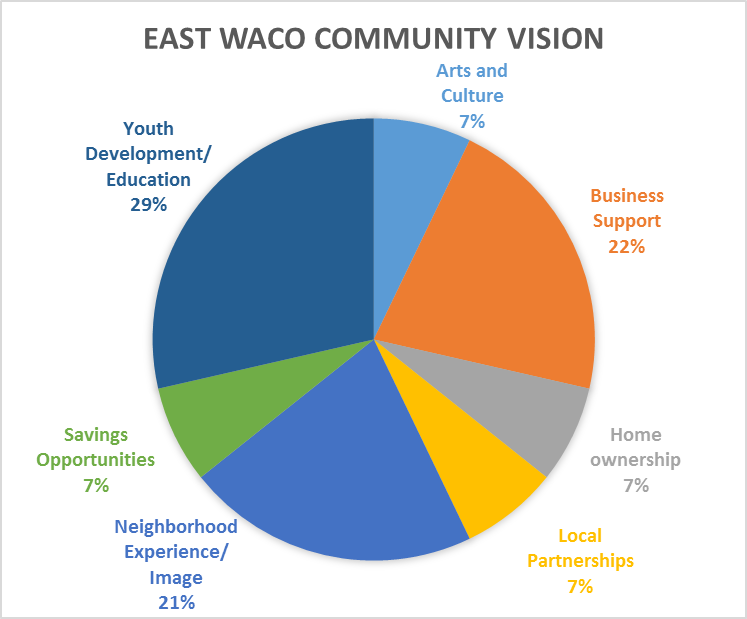
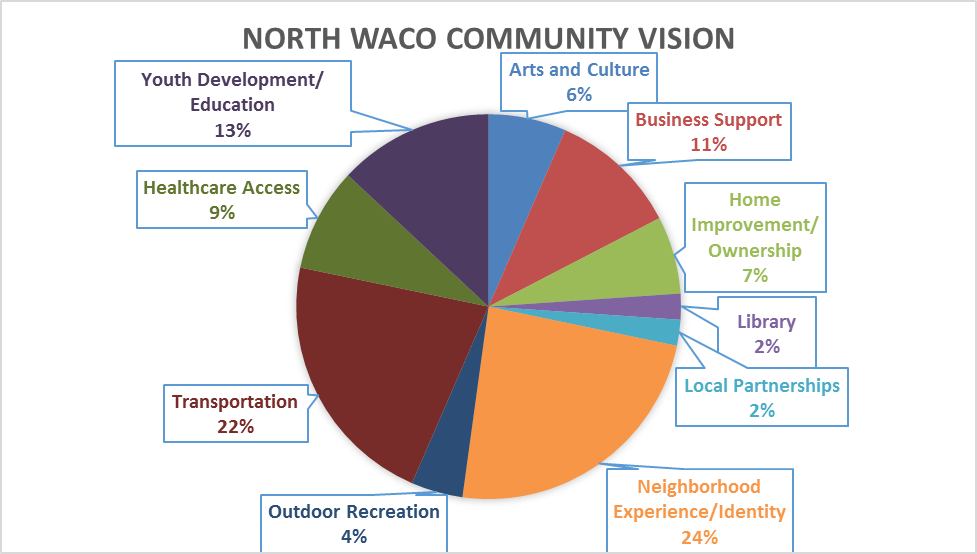
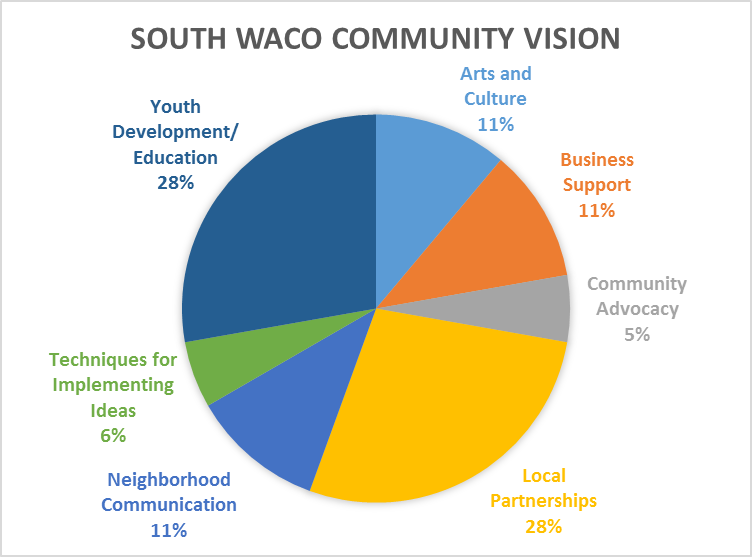
Lesson 2: Pity doesn’t help us listen- Empathy does.
In the field of non-profit work, and other helping professions, we find ourselves in a bit of a quandary sometimes. We are drawn to this work because of the change we want to see in the world, but often our desire to see change in the lives of people and communities paints a certain picture in our minds about people. We tend to see people through what data says about them, or their community. We receive messages about people as we look solely at the schools in their communities. We subscribe to narratives about people without even having to think about it. Messages are constant. Messages contribute to our understanding of people. Messages can be completely wrong. Try Googling the word “pregnant” and look at the images that come up. Now, put the word “poverty” in front of the word “pregnant” and hit search. Look at the images. Do you notice a difference?
I work with people in communities who bear heavy burdens of the stories that precede them before they even have a chance of showing up. Stories that are heavily influenced by an outsider’s perspective. Stories which play a role in every interaction. What learning has been affirmed for me in this series is that if I want to work with people, it is my responsibility to continually work at checking my biases and my pity (of whatever nature) at the door. To commit to the hard work of listening to truth, I must listen with empathy and not pity. When we engage people with pity, we run the risk of not affirming the agency of that person to contribute toward their own solutions for change. When we lead with empathy, we open ourselves up to learn.
Lesson 3: People are amazing- We need to level up!
When I decided that my own answers to other people’s problems would not create the change I hope to see in our community, I was afforded the opportunity to learn a lot more about the historical narratives and processes of change each community has been through. As they reflected on the history of their community, and started putting together strategies toward their vision, I learned how powerful truth is in the work of restoring our communities, and how important it is for that truth to be heard. In fact, 98% of more than 100 participants that have participated in the visioning so far responded “Agree” or “Strongly Agree” to the survey items: “I feel like my voice was heard”, and “This information was helpful to me, and/or my organization”. So, this last lesson is about my part, our part, in coming together. I leveled up by becoming proximate to the beautiful people and communities I hoped to see change in. I leveled up by listening to the truths they shared. And I leveled up by choosing to see what great things already exist, and what greater things we can create together.
Will you continue to level up with me? Our last series, “What’s Best?” will focus on putting the finishing touches on the vision, and finalizing the team that will carry this work forward. These communities are putting in good work, and change is on the way because of it. But it started by asking the right questions first.
What’s Best Series Event Information:
- Saturday, Sept. 9, 11:00 a.m. – 2:00 p.m., at Doris Miller YMCA
- Saturday, Sept. 16, 11:00 a.m. – 2:00 p.m., University High School Café
- Saturday, Sept. 23, 11:00 a.m. – 2:00 p.m., TBD (we will send you information soon with the location!)
For more information about What’s Up, Waco?, you can send me an email at [email protected].
 Elizabeth Ligawa is a recent graduate from Truett Theological Seminary, and the Diana R. Garland School of Social Work, earning both her Master of Divinity, and Master of Social Work. Though her prized role is being a mother to her dear son, Elijah, Liz has a love for encouraging people to come together in ways that engender healthy communities. Her role as the Director of Community Engagement at Prosper Waco allows her the room to work in and among the many faces of her beloved Waco community. She may be reached at [email protected].
Elizabeth Ligawa is a recent graduate from Truett Theological Seminary, and the Diana R. Garland School of Social Work, earning both her Master of Divinity, and Master of Social Work. Though her prized role is being a mother to her dear son, Elijah, Liz has a love for encouraging people to come together in ways that engender healthy communities. Her role as the Director of Community Engagement at Prosper Waco allows her the room to work in and among the many faces of her beloved Waco community. She may be reached at [email protected].
The Act Locally Waco blog publishes posts with a connection to these Aspirations for Waco. If you are interested in writing for the Act Locally Waco Blog, please email [email protected] for more information.
(Tami Nutall Jefferson, a married mother and grandmother, is going back to school and she has invited us all along to enjoy the ride. For more posts in this series, click here: Tami’s Big Do Over. – ABT )
By Tami Nutall Jefferson
In the middle of a conversation about nothing, I said, “Honey, I’m going to Howdy Week.” “What’s that?” While searching for an accurate description, and realizing that I didn’t know myself, It’s a week of parties!” just flew out of my mouth – and with such exuberance. The look I inspired was not a pleasant one. His response, “You can say ‘Howdy’ on Facebook.” I insisted that I must go. I knew I could seal the deal when I mentioned that I was going to the StartUp RoundUp student entrepreneur extravaganza. I don’t think his buy-in increased much. Nevertheless, welcome week — here I come!
The Backstory
There are several opportunities for students to ease into college life during the summer. The first is Fish Camp – a freshman tradition. One that I coveted as a local high schooler. But when I started receiving correspondence this year about it, I was like “just…no.” Then, there is T-Camp. Initially, I was excited about this. A camp just for transfer students – most of whom would NOT be 18 years old. I logged on to the website to find out more. Reasonably priced. Aggie Traditions. Make friends. Sign me up! Then I read the list of ‘items to bring’. The first three items listed were “pillow, pajamas, and blanket.” Wait. What the what?? This is a real damn camp!! I just closed the page. But then, you have “Howdy Week.” A chance to be a part of the Aggie community, participate in 2 hour events, AND sleep in my own bed. Perfect, I’m in!
It’s To Be Expected
I’m going to set out my expectations here. “Universe! I expect you to deliver.” Even though I’m 42 years old, I do have the same type of excitement and brand-newness that I would have had if I were 17 years old. I just don’t have the energy and heat tolerance.
- So my first expectation is that this week is going to really push me out of my comfort zone – which is everything at my fingertips in a chilled 72 degree environment.
- Half of me expects to capture my entire experience on social media – the other half of me expects that I will not want to (as I will be living in the moment).
- All of me expects to never have to pay for food and be fully stuffed on hot dogs, hamburgers, and Slovacek sausage – apparently, another Aggie tradition.
- I do expect to make at least 1 new friend (who is not a professor or employee). One of 30,000 is possible, right?
- I expect to not nap during the day. I repeat, NOT nap during the day. That’s called ‘reverse psychology’ for the non-academics in the audience.
- None of me expects to get ‘college-girl’ wasted. For some reason, that is my husband’s expectation though. Then I’ll be another college statistic. “Really, sir?”
- But in the end, I do expect to come back with at least one funny to tell you. If not, then I did not do my job as a…well…person. Every person should have at least one funny during any given week, right? And yes, I use funny as a noun, not an adjective.
Well, What Had Actually Happened Was…
So, now it’s the Monday after Howdy Week. Let’s recap, shall we. I made it to Howdy Week on Thursday. So my week, turned into a weekend. For some reason, I just couldn’t tear myself away from my exciting Waco life and my work projects to go and do basically nothing. As long as I’m there for StartUp RoundUp on Friday I’m good. And I was. And it was 6 hours of non-stop free gourmet food and million dollar business advice.
AND, I forced myself (now or never) to do the impromptu open mic business idea pitch contest – 30 seconds, no Q&A. And from that I did make 1 new friend. Later in the day, I made a few more. It was awesome! I did take several pictures, but I purposefully reminded myself not to selfie everything. But, not one Slovacek sausage! Instead of getting ‘college-girl’ wasted I got the equivalent of ‘fat-kid’ wasted. I ate so much this weekend. I don’t want to see food anymore this semester. Coincidentally, my favorite biz idea at StartUp RoundUp was from the guy who created the UniBees app that let’s you scroll through all the free food offerings on campus. Be still my tummy!
And I did get that funny. It’s in my Facebook album along with my photo ops and biz pitch video. My environmental comfort zone needed no pushing, as the weather in Bryan-College Station
was rather lovely the entire weekend. My naps were off the chart though, as all Howdy events were cancelled, and the rain makes one want to caress the bed all day.
Now, It’s Official
I am an Aggie! And a pretty strong and resilient woman. But, in the last five days, I have experienced every spectrum of emotion – loneliness, happiness, despair, hope, sadness, excitement, love, fatigue, disappointment, rejection. A lot of that from me walking around A&M alone. Experiences ranged from me being dismissed by someone who I thought was a professional colleague to imaginations of my daughter & grandson hailing a boat ride just outside of the doorstop or my sister & baby nieces sitting atop of their second story roof. I can’t begin to imagine what it’s like to be a true college freshman having to face all of these emotions this week – especially since so many of my fellow Aggies come from the coastal area. But my greatest hope now, is that we have no Silver Taps ceremonies for our current or former students. I hope that everyone is able to enjoy the belated semester start date, and I hope that as urban planning, construction, and design students we can continue those Facebook conversations we started about better infrastructure design, and building design, and stormwater management so that this weekend doesn’t happen again. God Bless Texas.
 Tami Nutall Jefferson has over a decade of experience in real estate sales and management and currently works as a home and building designer. This Fall she will begin her first academic year at Texas A&M University pursuing a Bachelor’s Degree in Urban Planning and Real Estate Development while commuting between Waco and College Station. Her hope is that Waco becomes the most attractive, modern, vibrant, and prosperous version of itself as an inclusive city and her professional mission is to help make that happen. Tami is also a 2017 graduate of the Leadership Plenty Institute and volunteers her time and voice to many downtown Waco placemaking and economic development causes and organizations.
Tami Nutall Jefferson has over a decade of experience in real estate sales and management and currently works as a home and building designer. This Fall she will begin her first academic year at Texas A&M University pursuing a Bachelor’s Degree in Urban Planning and Real Estate Development while commuting between Waco and College Station. Her hope is that Waco becomes the most attractive, modern, vibrant, and prosperous version of itself as an inclusive city and her professional mission is to help make that happen. Tami is also a 2017 graduate of the Leadership Plenty Institute and volunteers her time and voice to many downtown Waco placemaking and economic development causes and organizations.
To engage and share your non-traditional student experiences with Tami, contact her at [email protected] or connect with her on Facebook https://m.facebook.com/tami.nutall1
By CeRon Ford
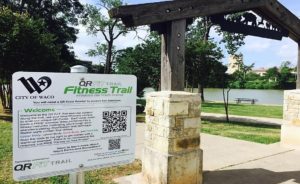 The summer climate and abundance of parks with green meadows make the City of Waco an ideal location for outdoor fitness. On a typical day, the sun is shining, the birds are chirping, and the breeze feels divine! Why confine yourself inside a gym for a workout? The QR Fitness Trail System allows you to replicate many gym exercises in the outdoors and all you need is your smartphone!
The summer climate and abundance of parks with green meadows make the City of Waco an ideal location for outdoor fitness. On a typical day, the sun is shining, the birds are chirping, and the breeze feels divine! Why confine yourself inside a gym for a workout? The QR Fitness Trail System allows you to replicate many gym exercises in the outdoors and all you need is your smartphone!
Through funding made available from the Texas Department of State Health Services and the Texas Healthy Communities grant, the Waco-McLennan County Public Health District and Live Well Waco have partnered with the City of Waco Parks and Recreation Department to have the QR FIT Trail system installed and ready to use in 11 neighborhood parks this summer. The QR Fitness Trail System will provide the perfect opportunity for community residents to lead an active lifestyle without the cost of a gym membership or fitness trainer.
The QR Fitness Trail System has been installed around walking and running trails in 11 parks throughout Waco:
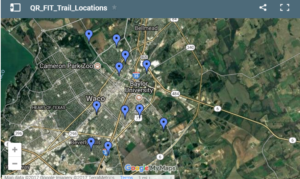 Alta Vista Park
Alta Vista Park- Bells Hill Park
- Bledsoe-Miller Park
- Brazos Park East
- Brooklyn Park
- Council Acres Park
- East Waco Park
- Gurley Park
- Kendrick Park
- Oakwood Park
- Oscar DuConge Park
The QR FIT Trail is a high tech fitness course designed for individuals of all ages. It is comprised of a series of signposts placed along the parks, and each sign post or station features Quick Response or QR codes that link a user’s smartphone to workout instructions and instructional videos. Park visitors will use the camera on their smartphones to scan the QR codes on each sign. Each workout station offers 4 workout options that focus on core, upper body, lower body and flexibility. For the users who may be intimidated by the difficulty of exercises, the fitness system provides users the option to select beginner, intermediate, or advanced. Free QR Code readers are available through smartphone app stores. Also, no additional fitness equipment is necessary in order to perform these exercises.
Alexis is a 27 year-old Waco resident who has set a goal to lose 15 pounds before her sister’s wedding in the next couple of months. Like many others, money is tight for Alexis. She does not have the funds to hire a fitness trainer or pay for a monthly gym membership. Alexis heard an ad about the QR Fitness Trail System while listening to the radio on the way to work one morning, so she decided that she would try the QR Fitness Trail System later that evening. Alexis mentioned that she briefly played volleyball in high school, but she has not dedicated much time to her physical fitness since then. However, since using the QR Fitness Trail System at her local park, Alexis has lost a total of five pounds just within a couple of weeks. When asked how effective has the QR Fit Trail System been, Alexis responded, “I think this is a great tool with a great purpose. It’s quick and easy for me to use, the trainers from the workout videos show me how to actually perform the exercise for my specific body area, and it costs me nothing!” Alexis also stated, “I would love to see more community members use this system, so I plan to invite my friends to use the QR Fitness Trail System so that they can get in shape too!”
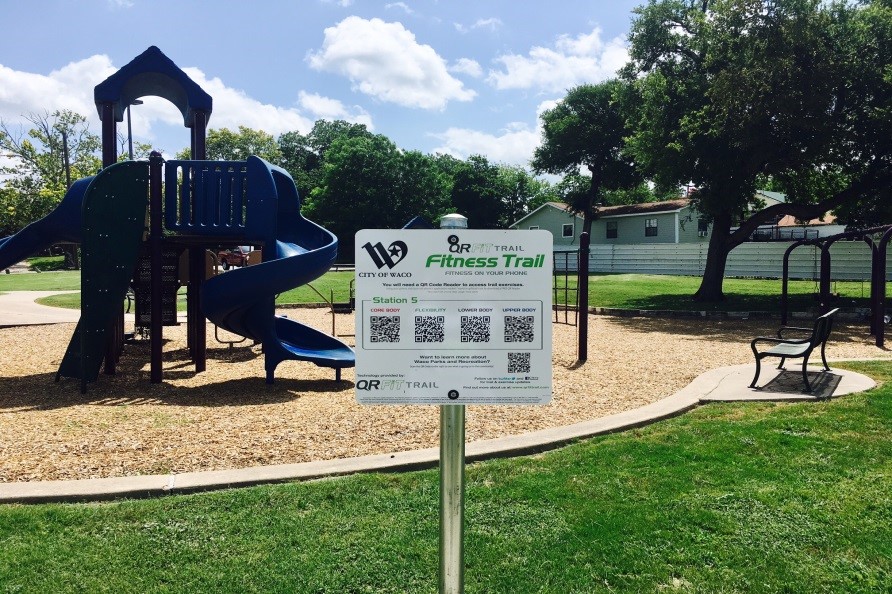
In the age of cable television, Facebook, YouTube and Instagram, it’s a great idea to travel beyond the screen or the front door and use your smartphone for something that will benefit you in the long run—like your health! There are many physical and mental benefits of exercising outdoors.
Research has proven that exercise help control and prevent the following:
- Heart disease
- Stroke
- Depression
- High blood pressure
- High cholesterol
- Type 2 diabetes
- Arthritis and much more
Studies have also shown that exercising outdoors can help people think more clearly, burn more calories, increase family time, meet your neighbors and save money. The right amount of fresh air and sunshine can be almost impossible to beat. Don’t let the summer pass you by, get to one of these local parks and get fit!
The QR Fitness Trail System is an awesome way to promote health and fitness in the City of Waco. This system is the best thing since sliced bread! The fitness system allows smartphone users to lose weight, get in shape, explore the neighborhood, experience the outdoors, and enjoy the beauty of Waco. Pick up your smartphone, grab a bottle of water, and head to one of these local parks!
Have questions about the fitness system? Want to show off how you and/or your friends and family us the QR Fitness Trail System? Share your photos and videos with us (@livewellwaco) on social media, and remember to include the hashtag #WacoQRFit.
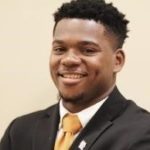 CeRon Ford moved to Waco in August 2013 to attend Baylor University. He received his Bachelors of Science in Public Health, and had the opportunity to intern at the Waco-McLennan County Public Health District as a Live Well Waco intern during his final summer in Waco. CeRon will further his efforts of pursuing public health by attending Morehouse School of Medicine’s Master of Public Health Program in Atlanta, Georgia, In the Fall 2017.
CeRon Ford moved to Waco in August 2013 to attend Baylor University. He received his Bachelors of Science in Public Health, and had the opportunity to intern at the Waco-McLennan County Public Health District as a Live Well Waco intern during his final summer in Waco. CeRon will further his efforts of pursuing public health by attending Morehouse School of Medicine’s Master of Public Health Program in Atlanta, Georgia, In the Fall 2017.
The Act Locally Waco blog publishes posts with a connection to these aspirations for Waco. If you are interested in writing for the Act Locally Waco Blog, please email [email protected] for more information.
Photo Credits: CeRon Ford Photography, Courtesy of Waco-McLennan County Public Health District, 2017
